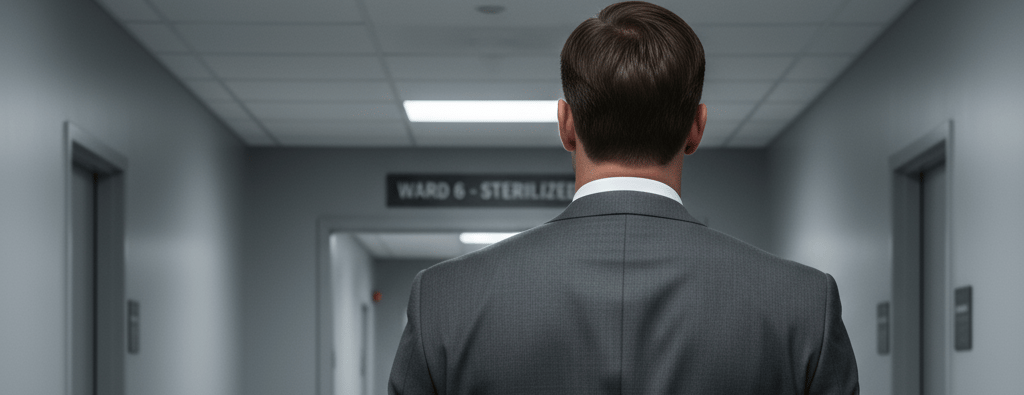The Arrival of Dr. Halbrook
He came on a Monday. Mondays are usually pudding days, vanilla cups that taste like artificial hope served with plastic spoons bent from previous disappointments. But that morning the pudding cart didn't make its rounds. Instead, we got silence and a clipboard thicker than scripture.
DARK RECESSES
Billy
9/12/20256 min read


The Arrival of Dr. Halbrook
The Man from the East Wing
He came on a Monday. Mondays are usually pudding days, vanilla cups that taste like artificial hope served with plastic spoons bent from previous disappointments. But that morning the pudding cart didn't make its rounds. Instead, we got silence and a clipboard thicker than scripture.
Dr. Halbrook wore a suit. Not a lab coat stained with coffee and good intentions. Not scrubs wrinkled from pulling double shifts. A suit. Gray as institutional paint, pressed sharp enough to cut glass. He didn't blink much, maybe once every thirty seconds, like a surveillance camera recording everything for evidence. His shoes didn't squeak on the linoleum. That's how we knew he wasn't one of us.
The staff moved differently around him. Nurse Patricia forgot to smile. Orderly Martin actually did his job. Even Dr. Bellamy straightened his corduroy jacket and hid his poetry notebook.
He introduced himself like a sermon delivered to empty pews:
"I'm here to assess the therapeutic integrity of Ward 6. There have been... irregularities reported. Non-standard treatment protocols. Concerning patient behaviors that suggest insufficient clinical oversight."
He paused, studying us like specimens under glass. Terry's tinfoil crown caught the fluorescent light. Marlene hummed under her breath, something that might have been "Can't Help Falling in Love" slowed to a funeral march. Leon took invisible notes. Sister Agnes clutched a granola bar like a rosary.
"I'll be conducting individual assessments over the next week," Halbrook continued. "Standard protocol will be reinstated immediately."
He didn't smile. Not once. Not even the fake therapeutic smile they teach in medical school.
The Evaluations Begin Again
Halbrook didn't believe in metaphor. He believed in metrics. Charts. Quantifiable improvement measured in reduced symptoms and medication compliance. He set up shop in the small conference room, the one with the broken clock that's been stuck at 3:47 for two years.
He interviewed each of us separately, armed with forms that looked like tax documents and a pen that clicked with mechanical precision.
Terry went first. He came back twenty minutes later, shaking like he'd been through actual battle. His tinfoil crown was missing. When I asked where it went, he whispered, "He said it was 'indicative of persistent delusional thinking requiring immediate intervention.'" Terry hadn't spoken without medieval references in months. Now he sounded like a medical textbook.
Marlene came back from her session and didn't speak for three hours. When she finally opened her mouth, it was to say, "He asked if I knew Elvis was dead. I told him death ain't nothing but a hound dog, keeps following you around." She laughed, but it sounded broken. "He didn't appreciate the wisdom."
Leon tried to diagnose Halbrook during his evaluation. "Classic authoritarian personality disorder with repressed creative impulses," he announced when he returned. But his invisible clipboard was gone, and I could see panic creeping into his eyes. "He asked if I understood that I'm not a doctor. I told him neither is he, he's just wearing the costume better."
Sister Agnes offered Halbrook a pudding cup during her session. He declined and told her that "displaced religious fervor toward processed foods indicates severe psychological regression." She came back crying, clutching her snacks closer. "He doesn't understand communion," she whispered. "He thinks God only speaks in diagnostic manuals."
My Evaluation
When my turn came, Halbrook's questions felt like ice picks chipping away at something fragile:
"Do you believe you are mentally ill, William?"
I wanted to say that illness implies something that can be cured, and some of us are just different frequencies trying to find our station. Instead, I said, "I believe I'm exactly as broken as I need to be."
He made a note. Click. Click.
"Do you understand the nature of your delusions regarding this so-called 'Fellowship'?"
"They're not delusions. They're friendships. There's a difference."
Click. Click. More notes.
"Do you think this 'Fellowship,' these group dynamics, are helping you recover?"
I looked at him for a long moment, studying the way his suit stayed perfectly pressed, the way his eyes stayed perfectly cold. "We're not recovering, Dr. Halbrook. We're remembering."
"Remembering what?"
"How to be human in a place designed to make us forget."
He wrote something down. I think it was a death sentence. Or at least a transfer order to somewhere darker, somewhere without pudding cups and friends who understand that galloping is sometimes the only way to move forward.
The Disruption of Ritual
Within forty-eight hours, Halbrook dismantled everything we'd built.
The escape rehearsals were banned. "Group delusions that reinforce maladaptive coping mechanisms," he called them. Leon's cardboard clipboard was confiscated as "props supporting false identity construction." Sister Agnes's snack chapel was shut down for "unsanitary food hoarding and religious obsession requiring immediate psychiatric intervention."
He cornered Dr. Bellamy in the hallway and I heard fragments through the thin walls: "... stop indulging the patients' fantasies... professional conduct... measurable outcomes... administrative review..."
Bellamy didn't argue. But later, I saw him in the supply closet, tearing pages from his poetry book and hiding them behind bottles of bleach. When he saw me watching, he pressed his finger to his lips. "Some things need to survive," he whispered.
Halbrook replaced our group therapy circle with "Cognitive Realignment Sessions." We sat in rows like students taking a test we'd already failed. No circle of chairs. No sharing emotional weather. Just worksheets with questions like "Rate your mood from 1-10" and "List three realistic goals for community reintegration."
The worksheets were gray. Everything Halbrook touched turned gray.
Terry stopped galloping. He sat perfectly still during sessions, hands folded, eyes empty. When I whispered "How's the weather in medieval France?" he just stared ahead and said, "There is no France. There is only Ward 6."
Marlene stopped singing. The silence where her voice used to be felt like a wound in the air. When someone hummed, she'd flinch like it hurt.
Leon stopped diagnosing everyone. He filled out his worksheets in perfect handwriting, answering every question with clinical precision. "Patient demonstrates improved reality testing," he wrote about himself. "Grandiose delusions significantly reduced."
Agnes stopped praying to the snack gods. She ate her meals mechanically, joylessly. When I asked if the vending machine was still speaking to her, she shook her head. "God only talks to doctors now," she said.
The Underground Railroad of Sanity
But something else started happening. Something Halbrook couldn't measure on his forms.
I started writing again. In secret. On napkins, in the margins of worksheets, on the back of medication cups. I wrote down everything, Terry's medieval wisdom, Marlene's Elvis prophecies, Leon's impossible diagnoses, Agnes's snack theology. I hid the writing in places Halbrook would never look: inside pillowcases, taped under tables, rolled up in toilet paper tubes.
Other people started passing me things. Terry slipped me a drawing of a horse with wings. Marlene hummed song titles in my ear when the nurses weren't looking. Leon scribbled psychiatric observations on torn napkin pieces. Agnes shared crackers like communion wafers.
We were going underground, becoming a resistance movement of the unwell.
The Spark of Rebellion
That night, the third night under Halbrook's regime, something beautiful happened.
I was sitting in the common room, pretending to read a magazine while actually writing on the back of a medication schedule, when I heard it: the soft clip-clop of institutional slippers on linoleum.
Terry was galloping again. Just once, down the hallway. No tinfoil crown. No medieval proclamations. Just defiance in the form of a grown man choosing to be a horse when being human had become impossible.
The sound woke something in the rest of us.
Marlene started humming, so quietly it was almost breathing, but I caught the melody of "Love Me Tender" turned into a lament. Leon pulled out a hidden napkin and started scribbling notes about the "therapeutic value of controlled regression in institutional settings." Agnes pressed a pretzel into my palm like she was passing state secrets.
Dr. Bellamy found me there twenty minutes later, surrounded by the quiet rebellion of the Fellowship. He looked around, saw Terry sitting motionless in his chair (but with a slight smile), heard Marlene's barely audible humming, watched Leon's careful note-taking and Agnes's secret snack distribution.
He sat down next to me and whispered, so quietly I almost missed it:
"Halbrook thinks he's curing you. But he's only waking you up."
I looked at him, this broken poet disguised as a therapist, this man who'd lost everything and somehow found us. "Waking us up to what?"
"To the fact that your madness might be the sanest response to an insane situation. And that sometimes, the only way to survive is to remember who you were before they told you who you should be."
In the distance, I could hear Halbrook's precise footsteps making evening rounds, checking boxes on his clipboard. But here in the common room, surrounded by my Fellowship of beautifully broken saints, something was stirring. Something that couldn't be measured or medicated or made to fit on forms.
We were remembering how to be gloriously, defiantly, healing-ly insane.
And tomorrow, we would start planning something that would make our escape rehearsals look like child's play.
Billy’s Journal Fragment
Dr. Halbrook is a scalpel. He cuts without bleeding. He says we are sick. That our rituals are symptoms. That our fellowship is a delusion. But I’ve seen delusion. It doesn’t look like pudding cups and whispered prophecies. It looks like silence. Like forgetting. He wants to make us forget. But we remember. We remember the escape rehearsal. The snack baptisms. The galloping. The songs. We remember who we are when no one’s watching. And we will not be erased.
info@billybeaner.com
480-366-3550 (Domain Sales)
© SDBEST LLC, 2025. All rights reserved.
